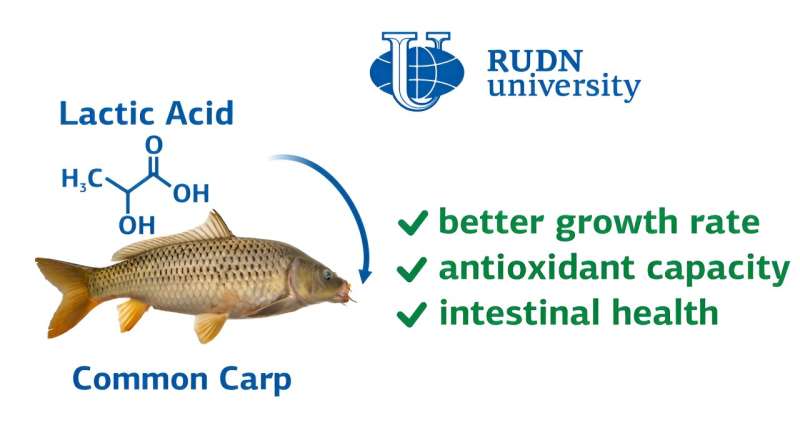This article has been reviewed according to Science X's editorial process and policies. Editors have highlighted the following attributes while ensuring the content's credibility:
fact-checked
peer-reviewed publication
proofread
Biologist improves carp growth with lactic acid

A RUDN University biologist and colleagues from Iran found that adding lactic acid to carp feed improves the growth and health of the fish. The authors selected the optimal concentration of the feed additive. It will help improve the quality of fish products. The results were published in the journal Animals.
In fish farming, acidifiers are used as food additives—for example, lactic, formic, or citric acid. They help develop intestinal villi, increase the population of beneficial bacteria, and reduce intestinal acidity. It has already been proven that, for example, lactic acid improves the growth and health of some fish (beluga in particular) but does not have the same effect on others (mykiss and trout). A RUDN biologist and colleagues from Iran studied the effect of lactic acid on common carp, a tasty fish from the world's top-5 by production volume.
"Fish farmers want to make farming cheaper and feeding fish more efficient. Feed additives, such as acidifiers, have become popular due to their positive effects on fish growth and health. Lactic acid is one of the well-known acidifying agents in the fishing industry. However, data on its effect on common carp remains incomplete. Meanwhile, this is a very popular fish in many countries, thanks to its dense and tasty meat. Carp grow quickly and can survive in a wide range of environmental conditions," said Morteza Yousefi, Associate Professor of the Department of Veterinary Medicine at RUDN University.

Biologists studied the effect of lactic acid on the growth of carp Cyprinus carpio, as well as on the activity of digestive and antioxidant enzymes in the intestine, gene expression, and bacterial microflora of the fish. The authors compared four diets—without lactic acid and with the supplement at concentrations of 2.5, 5, and 10 grams.
The experiment showed that five grams of lactic acid improved growth. Weight gain increased to 94%, compared to 78% for fish without additional lactic acid in the feed. At all concentrations, lactic acid significantly increased the content of the enzymes trypsin and chymotrypsin, which are involved in the breakdown of proteins, as well as the activity of several genes responsible for immunity. The population of beneficial Lactobacillus sp. increased 2–6 times. At the same time, the population of pathogenic bacteria Aeromonas sp. and Vibrio sp. decreased by 2–4 times. Summarizing the effects, biologists found the optimal concentration of lactic acid at a dose of 5 grams per kilogram of feed.
"Lactic acid supplements improve carp growth and feed efficiency. The activity of intestinal enzymes increases, the expression of genes associated with the immune response increases, the population of beneficial bacteria increases, and antioxidant properties are activated. Probably, all this is due to the dominance of beneficial bacterial communities in the intestines of fish," said Morteza Yousefi, associate professor of the department of veterinary medicine at RUDN University
More information: Seyyed Morteza Hoseini et al, Effects of Dietary Lactic Acid Supplementation on the Activity of Digestive and Antioxidant Enzymes, Gene Expressions, and Bacterial Communities in the Intestine of Common Carp, Cyprinus carpio, Animals (2023). DOI: 10.3390/ani13121934
Journal information: Animals
Provided by Russian Foundation for Basic Research





















